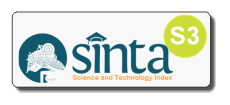The Role of Resilience in Minimizing Conditions of Learned Helplessness in Undergraduate Students at Universitas Negeri Malang
Abstract
The condition of learned helplessness is a condition that is vulnerable to undergraduate students. Various conditions of learned helplessness in students can be caused by changes in the environment, daily activities, and even academic challenges. Furthermore, this condition can impact a state of depression and even suicidal ideation in students. Various efforts are made to minimize or inhibit the negative impact of learned helplessness conditions by students through strengthening internal strengths within individuals, such as resilience. This research was conducted to see the role of resilience in minimizing conditions of learned helplessness among undergraduate students at Universitas Negeri Malang. This research is quantitative research with a correlational research design. Participants in this research were active undergraduate students at Universitas Negeri Malang. The instrument used to measure learned helplessness is the Learned Helplessness Scale (LHS) and the Adult Resilience Measurement Revised (ARM-R) for resilience. Both of them were adapted into Indonesian. The total participants involved in this research were 85 students from 8 faculties (M is equal to 19.99 ± 1.66). The results of the research show that there is a role of resilience in the condition of learned helplessness among undergraduate students of Universitas Negeri Malang, which is 23 percent.
Full Text:
PDFReferences
American Psychiatric Association. (2013). Diagnostic and Statistical Manual of Mental Disorder: Fifth Edition (DSM-5). Washington, DC: American Psychiatric Publishing.
Ang, W. H. D., Shorey, S., Lopez, V., Chew, H. S. J., & Lau, Y. (2022). Generation Z Undergraduate Students’ Resilience During the COVID-19 Pandemic: A Qualitative Study. Current Psychology, 41(11), 8132–8146. https://doi.org/10.1007/s12144-021-01830-4
Azwar, S. (2010). Metode Penelitian. Yogyakarta: Pustaka Pelajar Offset.
Dağgöl, G. D. (2018). An Examination of Turkish College-Level Students’ Learned Helplessness States in EFL Context. Journal of Higher Education and Science, 8(1), 145–161. https://doi.org/10.5961/jhes.2018.257
DiCorcia, J. A., & Tronick, E. (2011). Quotidian Resilience: Exploring Mechanisms That Drive Resilience From a Perspective of Everyday Stress and Coping. Neuroscience and Biobehavioral Reviews, 35(7), 1593–1602. https://doi.org/10.1016/j.neubiorev.2011.04.008
Dwiastuti, I., Hendriani, W., & Andriani, F. (2022). The Impact of Academic Resilience on Academic Performance in College Students During the Covid-19 Pandemic. KnE Social Sciences, 25–41. https://doi.org/10.18502/kss.v7i1.10198
Ekechukwu, R., & Isiguzo, B. C. (2015). Psychological Factors Associated With Learned Helplessness Among Adolescents in Rivers State. European Journal of Research and Reflection in Educational Sciences, 3(4), 89–96.
Ettman, C. K., Abdalla, S. M., Cohen, G. H., Sampson, L., Vivier, P. M., & Galea, S. (2020). Prevalence of Depression Symptoms in US Adults Before and During the COVID-19 Pandemic. JAMA Network Open, 3(9), e2019686. https://doi.org/10.1001/jamanetworkopen.2020.19686
Feyisa, B. R., Merdassa, A. B., & Biru, B. (2022). Psychological Resilience and Coping Strategies Among Undergraduate Students in Ethiopia: A Cross-Sectional Study. International Journal of Adolescence and Youth, 27(1), 515–527. https://doi.org/10.1080/02673843.2022.2151370
Field, A. (2009). Discovering Statistics Using SPSS (3rd ed.). Los Angeles: SAGE Publications Ltd.
Findyartini, A., Greviana, N., Putera, A. M., Sutanto, R. L., Saki, V. Y., & Felaza, E. (2021). The Relationships Between Resilience and Student Personal Factors in an Undergraduate Medical Program. BMC Medical Education, 21(1), 113. https://doi.org/10.1186/s12909-021-02547-5
Galatzer-Levy, I. R., Burton, C. L., & Bonanno, G. A. (2012). Coping Flexibility, Potentially Traumatic Life Events, and Resilience: A Prospective Study of College Student Adjustment. Journal of Social and Clinical Psychology, 31(6), 542–567. https://doi.org/10.1521/jscp.2012.31.6.542
Ghogare, A. S., Patil, P. S., Spoorthy, M. S., Aloney, S. A., Bele, A. W., & Ambad, R. S. (2022). Depression, Anxiety, Stress and Resilience Among Undergraduate Health Sciences Students of a Rural Tertiary Healthcare Centre in Maharashtra During the COVID-19 Lockdown: A Cross-Sectional, Online Survey. The National Medical Journal of India, 35(3), 147–152. https://doi.org/10.25259/NMJI-35-3-147
Gravetter, F. J., & Forzano, L.-A. B. (2016). Research Methods for the Behavioral Sciences (4th ed.). Boston: Cengage Learning.
Islam, M. A., Low, W. Y., Tong, W. T., Yuen, C. C. W., & Abdullah, A. (2018). Factors Associated with Depression among University Students in Malaysia: A Cross-sectional Study. KnE Life Sciences, 415–427. https://doi.org/10.18502/kls.v4i4.2302
Lei, X.-Y., Xiao, L.-M., Liu, Y.-N., & Li, Y.-M. (2016). Prevalence of Depression among Chinese University Students: A Meta-Analysis. PLOS ONE, 11(4), e0153454. https://doi.org/10.1371/journal.pone.0153454
Lima, C. L. S., Veloso, L. U. P., Lira, J. A. C., Silva, A. G. N., Rocha, Â. R. C., & Conceição, B. B. (2021). Factors Related to Hopelessness in College Students. Cogitare Enfermagem, 26, e76641.
Masten, A. S. (2021). Resilience in Developmental Systems: Principles, Pathways, and Protective Processes in Research and Practice. In M. Ungar (Ed.), Multisystemic Resilience: Adaptation and Transformation in Contexts of Change (p. 0). Oxford: Oxford University Press. https://doi.org/10.1093/oso/9780190095888.003.0007
Mohanty, A., Pradhan, R. K., & Jena, L. K. (2015). Learned Helplessness and Socialization: A Reflective Analysis. Psychology, 6(7), Article 7. https://doi.org/10.4236/psych.2015.67087
Niu, G., Shi, X., Yao, L., Yang, W., Jin, S., & Xu, L. (2023). Social Exclusion and Depression Among Undergraduate Students: The Mediating Roles of Rejection Sensitivity and Social Self-Efficacy. Current Psychology, 42(28), 24198–24207. https://doi.org/10.1007/s12144-022-03318-1
Noh, D., & Park, S. (2022). Mediating Effects of Social Support and Resilience on the Association between COVID-19-Related Stress and Mental Health in Korean Young Adults. International Journal of Environmental Research and Public Health, 19(11), Article 11. https://doi.org/10.3390/ijerph19116935
Pambudhi, Y. A. (2021). College Students Academic Resilience During Online Lectures. Proceeding International Seminar of Multicultural Psychology (ISMP 1st) Faculty of Psychology Universitas 17 Agustus 1945 Surabaya, 271–280.
Pidgeon, A. M., Rowe, N. F., Stapleton, P., Magyar, H. B., & Lo, B. C. Y. (2014). Examining Characteristics of Resilience among University Students: An International Study. Open Journal of Social Sciences, 2(11), Article 11. https://doi.org/10.4236/jss.2014.211003
Prihadi, K., Tan, C. Y. H., Tan, R. T. S., Yong, P. L., Yong, J. H. E., Tinagaran, S., & Yeow, J. L. H. (2018). Procrastination and Learned-Helplessness among University Students: The Mediation Effect of Internal Locus of Control. Electronic Journal of Research in Educational Psychology, 16(46), 579–595.
Quinless, F. W., & Nelson, M. A. (1988). Development of a Measure of Learned Helplessness. Nursing Research, 37(1), 11–15.
Rahat, E., & Ilhan, T. (2016). Coping Styles, Social Support, Relational SelfConstrual, and Resilience in Predicting Students’ Adjustment to University Life. Educational Sciences: Theory & Practice, 16(1), 187–208. https://doi.org/10.12738/estp.2016.1.0058
Reivich, K., Gillham, J. E., Chaplin, T. M., & Seligman, M. E. P. (2013). From Helplessness to Optimism: The Role of Resilience in Treating and Preventing Depression in Youth. In Handbook of Resilience in Children (2nd ed., pp. 201–214). New York: Springer Science + Business Media. https://doi.org/10.1007/978-1-4614-3661-4_12
Seligman, M. E. P., & Peterson, C. (2001). Learned Helplessness. In N. J. Smelser & P. B. Baltes (Eds.), International Encyclopedia of the Social & Behavioral Sciences (pp. 8583–8586). Oxford: Pergamon. https://doi.org/10.1016/B0-08-043076-7/00378-8
Swanson, J. N., Dougall, A. L., & Baum, A. (2012). Learned Helplessness. In V. S. Ramachandran (Ed.), Encyclopedia of Human Behavior (2nd ed., pp. 525–530). San Diego: Academic Press. https://doi.org/10.1016/B978-0-12-375000-6.00220-2
Tariq, H., Pathirage, C., & Fernando, T. (2021). Measuring Community Disaster Resilience at Local Levels: An Adaptable Resilience Framework. International Journal of Disaster Risk Reduction, 62, 102358. https://doi.org/10.1016/j.ijdrr.2021.102358
Uehara, T., Takeuchi, K., Kubota, F., Oshima, K., & Ishikawa, O. (2010). Annual Transition of Major Depressive Episode in University Students Using a Structured Self-Rating Questionnaire. Asia-Pacific Psychiatry, 2(2), 99–104. https://doi.org/10.1111/j.1758-5872.2010.00063.x
Ungar, M. (2016). The Resilience Research Centre Adult Resilience Measure (RRC-ARM). Halifax: Resilience Research Centre.
Valdés, J. M., Díaz, F. J., Christiansen, P. M., Lorca, G. A., Solorza, F. J., Alvear, M., Ramírez, S., Nuñez, D., Araya, R., & Gaete, J. (2022). Mental Health and Related Factors Among Undergraduate Students During SARS-CoV-2 Pandemic: A Cross-Sectional Study. Frontiers in Psychiatry, 13. https://www.frontiersin.org/articles/10.3389/fpsyt.2022.833263
Versteeg, M., & Kappe, R. (2021). Resilience and Higher Education Support as Protective Factors for Student Academic Stress and Depression During Covid-19 in the Netherlands. Frontiers in Public Health, 9. https://www.frontiersin.org/articles/10.3389/fpubh.2021.737223
Wu, Y., Yu, W., Wu, X., Wan, H., Wang, Y., & Lu, G. (2020). Psychological Resilience and Positive Coping Styles Among Chinese Undergraduate Students: A Cross-Sectional Study. BMC Psychology, 8(1), 79. https://doi.org/10.1186/s40359-020-00444-y
Yu, X., Xiong, F., Zhang, H., Ren, Z., Liu, L., Zhang, L., & Zhou, Z. (2023). The Effect of Social Support on Depression Among Economically Disadvantaged College Students: The Mediating Role of Psychological Resilience and the Moderating Role of Geography. International Journal of Environmental Research and Public Health, 20(4), Article 4. https://doi.org/10.3390/ijerph20043053
Zhang, C., Shi, L., Tian, T., Zhou, Z., Peng, X., Shen, Y., Li, Y., & Ou, J. (2022). Associations Between Academic Stress and Depressive Symptoms Mediated by Anxiety Symptoms and Hopelessness Among Chinese College Students. Psychology Research and Behavior Management, 15, 547–556. https://doi.org/10.2147/PRBM.S353778
Ziegler, A., Bedenlier, S., Gläser-Zikuda, M., Kopp, B., & Händel, M. (2021). Helplessness Among University Students: An Empirical Study Based on a Modified Framework of Implicit Personality Theories. Education Sciences, 11(10), Article 10. https://doi.org/10.3390/educsci11100630
Zimmerman, M. A. (2013). Resiliency Theory: A Strengths-Based Approach to Research and Practice for Adolescent Health. Health Education & Behavior, 40(4), 381–383. https://doi.org/10.1177/1090198113493782
DOI: http://dx.doi.org/10.17977/um023v12i22023p284-293
Refbacks
- There are currently no refbacks.
Copyright (c) 2023 Jurnal Sains Psikologi

This work is licensed under a Creative Commons Attribution 4.0 International License.
Reference Manager :
|
Aliansi:
Plagiarism Checker :
This work is licensed under a Creative Commons Attribution 4.0 International License.



1.png)








